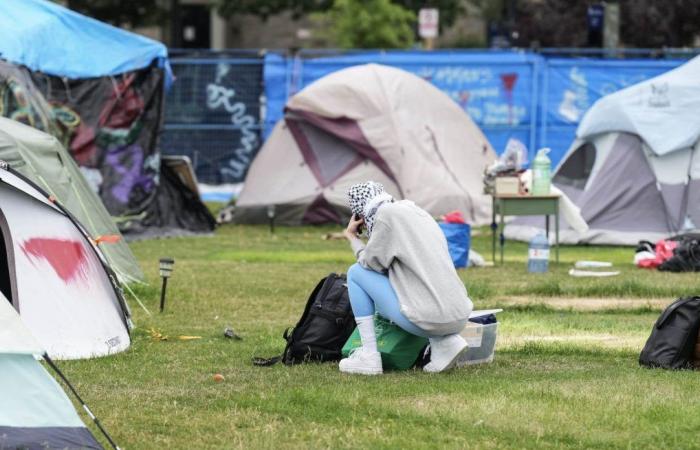The University of Toronto suffered irreparable harm from a pro-Palestinian protest encampment that took over part of its downtown campus, an Ontario judge ruled Tuesday, ordering protesters to dismantle the site.
The injunction issued Tuesday afternoon orders protesters to dismantle tents and structures by 6 p.m. Wednesday and prohibits them from obstructing access to university property, setting up new tents or structures, or using the site without permission between 11 p.m. and 7 a.m.
It also gives the police the power to arrest and deport anyone who knows about the order and contravenes it.
In his decision, Ontario Superior Court Justice Markus Koehnen said that while there was no evidence that the encampment participants were violent or anti-Semitic, the protest took away the university’s ability to control what happens in the area known as King’s College Circle.
Case law clearly indicates that this constitutes irreparable harm, the judge wrote.
“In our society, we have decided that the owner of a property generally decides what happens there,” Judge Koehnen argued.
“If the protesters can seize this power by taking over the main campus, there is nothing to stop a stronger group from coming in and taking over from the current protesters. This leads to chaos,” he added.
The protesters controlled access to the area in a way that excluded those who disagreed with them, as well as those who “simply wanted to use the main campus as an attractive recreational space,” the judge said.
He said the harm to the university if the encampment were allowed to remain would be greater than the harm to the protesters if it were torn down, noting that protesters would still be allowed to demonstrate in a way that does not involve camping or staying overnight.
Search for consensus
On Tuesday night, protesters at the camp were removing signs from the outer fences. A man entered the camp, taunting and swearing at the students in the camp, who did not react or respond.
The group did not say whether it planned to comply with the court order. However, Sara Rasikh, a graduate student who has acted as a spokesperson for the camp, said they were trying to make decisions by reaching consensus.
The Toronto Police Service said in a brief statement released to X on Tuesday night that it would enforce the court order, but hoped protesters would leave on their own to avoid police action.
“The 6pm deadline applies to protesters. While we will not disclose operational details, the court order states that police action is at our discretion. We are currently finalizing those details,” the statement said.
A university spokesperson assured that the decision “will reinstate King’s College Circle for use by all members of the University of Toronto community.”
“We are confident that those in the camp will comply with the court order and leave the camp by the court-ordered deadline. Anyone who chooses to remain in the camp after this deadline will be subject to the consequences of university policy and the law,” the institution warned in a statement.
More determined than ever
The protesters set up camp on May 2 and had previously said they would remain there until the school agreed to their demands, which include disclosure and divestment of investments in companies profiting from Israel’s offensive in Gaza.
Sima Atri, a lawyer who represented the protesters at the injunction hearing, said the decision was based on a single legal principle: who owns private property.
“This decision only governs one specific tactic, and there are many other ways to continue to push for the students’ demands and for the Palestinian movement as a whole,” Atri said.
The court’s decision said the university had procedures in place to review divestment requests and offered protesters an expedited process.
“It is now time for the protesters to peacefully dismantle the encampment and focus their energies on building support within the group that will investigate divestment and within the broader academic community to persuade both groups that divestment is a worthy goal,” the judge wrote.
“Persuasion will not be achieved by occupation, but by reasoned discussion.”
Mohammad Yassin, who was at the camp on Tuesday after the decision was made, said the group’s “determination is stronger than ever.”
“The presence of police on our campus is a stark reminder of the methods our administration will use to maintain its complicity in genocide,” he said.
The university sought an injunction late last month after protesters ignored a trespass notice and a deadline to vacate the premises.
The school asked the court to allow police action to evict protesters who refuse to leave, and to prohibit protesters from blocking access to university property or setting up fences, tents or other structures on campus.
The university initially sought the injunction on an emergency basis because the encampment is near Convocation Hall, where graduation ceremonies are scheduled to take place over several weeks this month.
The court heard the petition over two days last week, after most ceremonies had concluded. No major disruptions were reported.
The group did not say Tuesday whether it planned to comply with the court order, saying it would discuss it before Wednesday’s deadline.






